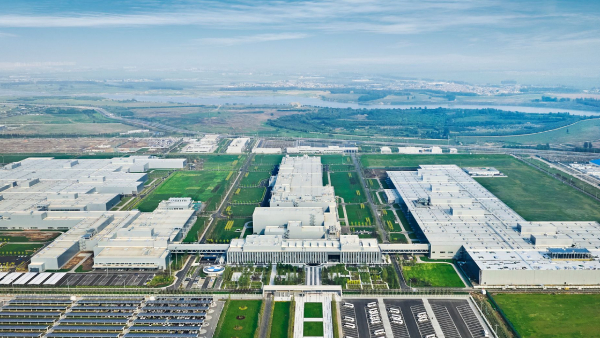By Luo Shanshan, Yang Yanfan, Li Gang, People’s Daily
The first six months of 2023 witnessed foreign investors’ confidence in the Chinese market.
BMW Brilliance Automotive, BMW Group’s joint venture in China, announced to start producing its next-generation of electric vehicle (EV) models in 2026 in Shenyang, northeast China’s Liaoning province. A 10-billion-yuan ($1.39 billion) plant for BMW’s sixth-generation high-voltage batteries for the new EV models has broken ground.
German industrial giant Siemens announced a plan to increase investments in China, including an additional 1.1 billion yuan in fixed-asset investment for its industrial automation products smart manufacturing base in Chengdu, southwest China’s Sichuan province.
Multinational pharmaceutical company AstraZeneca signed an agreement with Qingdao high-tech industrial development zone in east China’s Shandong province. According to the agreement, AstraZeneca will expand its production and investment in China, set up a regional headquarter in the city, and build an innovation center focusing on the diagnosis and treatment of rare diseases.
China, constantly providing new opportunities for the world with its own development, is a hot destination for foreign investment.
In the first five months of this year, the actual use of foreign direct investment (FDI) in the Chinese mainland reached 574.81 billion yuan. A total of 18,532 new foreign-invested enterprises were established in China in the same period, up 38.3 percent year-on-year.
Since this year, China has been frequently visited by foreign government officials, heads of international organizations and executives of multinational corporations. Representatives of foreign companies joined trade fairs and visited industrial parks across China to seek cooperation opportunities with Chinese enterprises, demonstrating their strong confidence in China’s economic prospects and urgent demand for strengthening cooperation with China.
In the first five months of this year, the actual use of FDI in the manufacturing industry grew 5.9 percent to 147.08 billion yuan. The actual use of FDI in high-tech industries rose 7.5 percent year-on-year, of which high-tech manufacturing increased by 30.8 percent.
During the same period, the actual investment in China from France, the UK, Canada and Japan went up by 429.7 percent, 179.2 percent, 170.1 percent and 63.3 percent respectively.
A survey was recently conducted by the China Council for the Promotion of International Trade, which covered over 600 foreign-invested companies. It said 97 percent of the surveyed foreign firms are satisfied with China’s policies on boosting foreign investment that rolled out from the fourth quarter of last year to date.
According to the estimation of the State Administration of Foreign Exchange, the return rate of foreign investment in China stood at 9.1 percent in the past five years. The data in Europe and the United States was about 3 percent, and that in emerging economies was from 4 percent to 8 percent.
Against the backdrop of sluggish global economic growth, China is undoubtedly an important destination for foreign investors.
Driven by high-quality development, China enjoys prominent advantages as a super-large market with its domestic demand potential. Experts believe that China, amid accelerated upgrading of its energy structure, industrial structure, transport structure as well as production and lifestyle, will bring abundant opportunities for transnational investment.
Japan’s Panasonic Corporation is optimistic about China’s green and low-carbon development. According to executive vice president Tetsuro Homma, Panasonic has built five zero-carbon factories in China and this number is expected to hit 16 by 2024. All of Panasonic factories will achieve zero net carbon emissions by 2030, said Tetsuro Homma, who’s also the chairman of the Japanese Chamber of Commerce and Industry in China.
Panasonic will keep exploiting its technologies and applications in hydrogen fuel cells, and work with its Chinese partners to assist the development of the Chinese new energy industry, he noted.
Recently, Volkswagen Group announced to establish in China a new R&D company focusing on the development of advanced EVs and intelligent networked vehicles. The company is expected to become the second largest R&D center of Volkswagen following the one at its German headquarters.
Ralf Brandstatter, who heads Volkswagen in China, said that China is currently leading the transition to EVs. He believes that the annual sales volume of China’s automobile market will grow to between 28 million and 30 million units by 2030, and new energy vehicles will account for 74 percent and pure EVs over 55 percent, he said.
China’s Ministry of Commerce (MOFCOM) on July 5 held a roundtable for foreign-invested firms. Relying on the foreign trade and investment coordination service mechanism, MOFCOM has set up a higher-level roundtable system based on regular exchange mechanisms.
Through this institutional arrangement, regular meetings will be held to widen channels for collecting issues and comments, respond to and address business concerns in a timely manner and enable long-term and stable development of foreign-invested enterprises in China, said Minister of Commerce Wang Wentao.
To attract and utilize foreign investment, regions across China are actively optimizing the business environment and smoothening the flow of factors.
China boasts social stability, massive investment opportunities and considerable return on investment, which is very attractive for enterprises around the world.
As the country embarks on a new journey toward Chinese modernization, it will only open its door wider to the world with a better business environment and better services. An opening and developing China will definitely attract more foreign enterprises, share development opportunities with them and achieve win-win results.













